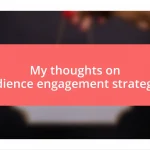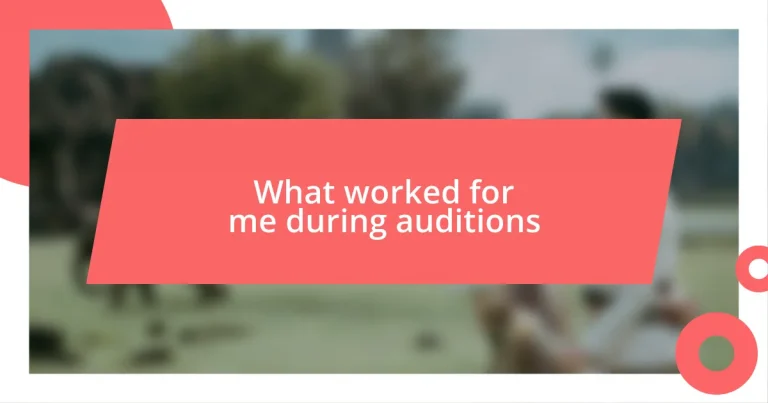Key takeaways:
- Preparation involves creating a routine, mastering material, and using visualization techniques to boost confidence and performance.
- Understanding the audition process, including room dynamics and the value of feedback, helps adapt and improve future performances.
- Embracing vulnerability and learning from experiences, both positive and negative, fosters personal growth and resilience in the audition journey.
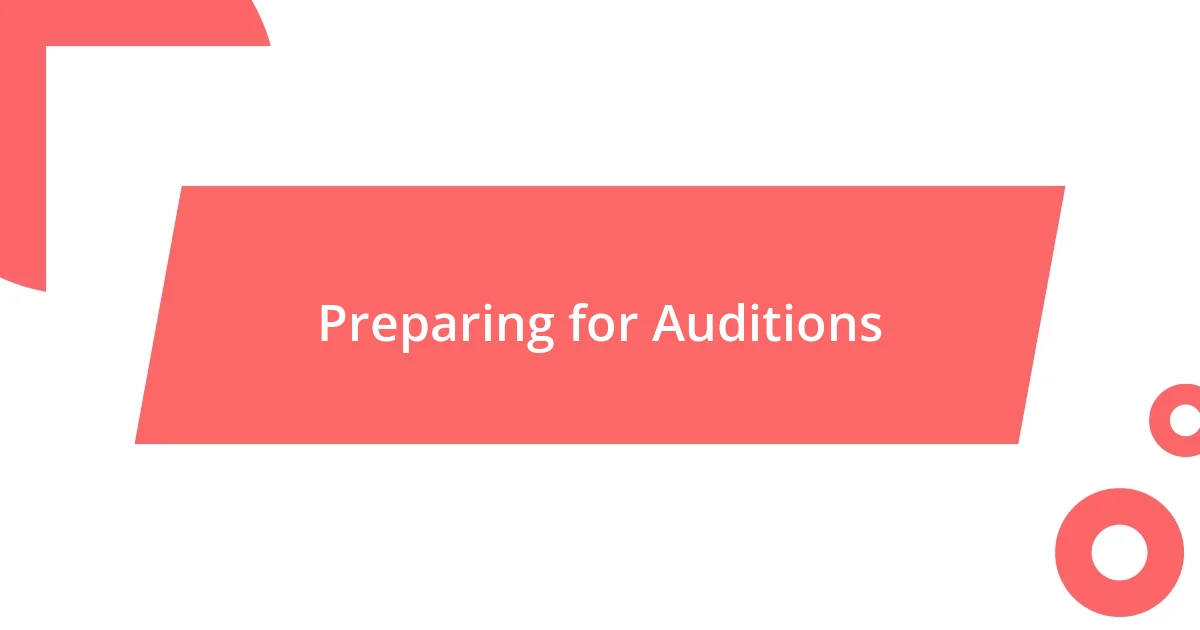
Preparing for Auditions
Preparing for auditions is all about finding what works best for you. I remember my first big audition—I was so nervous that I almost didn’t go. But I learned that creating a routine, whether it’s warm-up exercises or vocal breaths, helped ground me. Have you ever considered how your pre-audition habits can set the tone for your performance?
Another crucial aspect is knowing your material inside and out. I once auditioned for a role that seemed perfect for me, but I stumbled during the reading because I hadn’t practiced enough. That moment taught me a valuable lesson: confidence comes from preparation. Do you feel equipped to tackle your script when you step into the audition room, or do you get caught off guard?
Additionally, visualizing success can significantly impact your mindset. On one occasion, before stepping into an audition for a musical, I closed my eyes and imagined myself on the stage, fully immersed in the role. I felt the energy of the audience, and honestly, it transformed my approach. What are your visualization techniques? I find that picturing a positive outcome helps channel any anxiety into excitement.
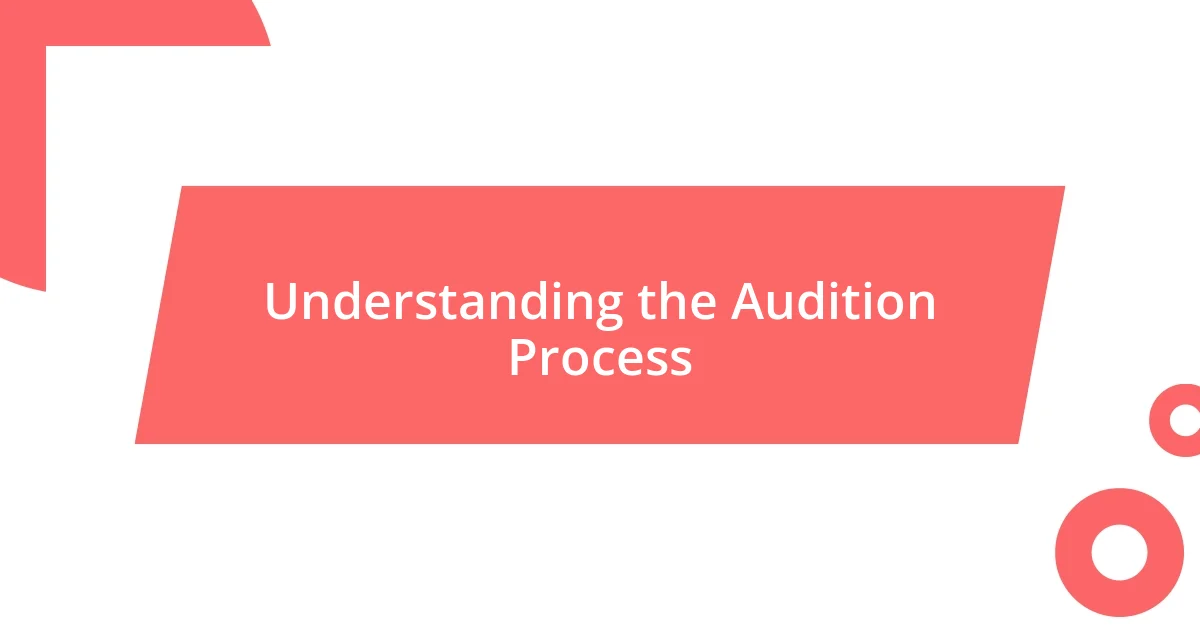
Understanding the Audition Process
Understanding the audition process is essential for success. Each audition can feel like a mini rollercoaster ride, filled with anticipation and anxiety. I remember walking into my first professional audition; my heart was racing. I quickly realized that understanding the structure of an audition, from the check-in to the final leave, was crucial. It helped me mentally prepare for each stage of the experience.
The dynamics of the audition room can vary significantly depending on a variety of factors—like the size of the casting team or the format of the audition. I recall one audition where there were only two people in the room, and it felt intimate and supportive. Contrast that with an open call where dozens of hopefuls waited in line; the atmosphere felt completely different and more competitive. Recognizing these vibes enabled me to adapt my performance and respond better to the energy around me.
Lastly, feedback is an often overlooked yet vital component of the audition experience. Early on, I tended to view feedback as criticism, but I learned to see it as a valuable opportunity for growth. After one particularly tough audition, I received constructive criticism that helped shape my next performance. Have you tried asking for specific feedback after you audition? It can lead to insights that you wouldn’t have considered otherwise.
| Factor | Experience |
|---|---|
| Understanding Structure | Prepares you for every stage of the audition. |
| Room Atmosphere | Affects your performance and mindset. |
| Value of Feedback | Turn criticisms into opportunities for growth. |
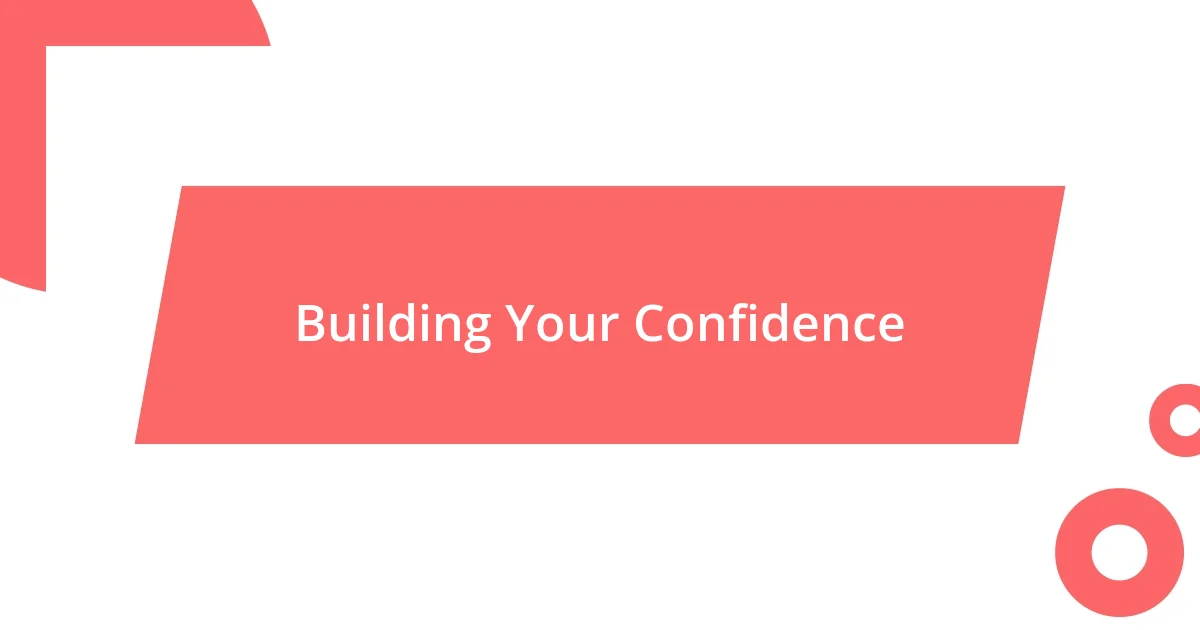
Building Your Confidence
Building your confidence is an essential part of the audition process. I remember my first time truly feeling self-assured—it was an experience rooted in small victories. I used to focus too much on what could go wrong. Instead, I started celebrating each moment I felt good about, like nailing a line during rehearsals or getting positive comments from friends. Those little victories built up my confidence, and they can do the same for you.
Here are a few techniques that have worked wonders for me in boosting confidence:
- Positive affirmations: Recite them daily to help shift your mindset.
- Practice in front of others: Gathering a small group of friends for a mock audition can simulate the real experience.
- Set realistic goals: Focus on specific aspects of your performance that you want to improve, like your delivery or expression.
- Dress the part: Wearing something that makes you feel confident can elevate your mood and perspective.
- Deep breathing exercises: They can calm your nerves and center your focus before stepping onstage.
Remember, confidence is built over time, and each step forward counts.

Mastering Your Material
Mastering your material is a game-changer when it comes to auditions. I can’t stress enough how knowing your lines inside and out can relieve so much pressure. I remember prepping for an audition where I was cast to perform a challenging monologue. I practiced it repeatedly, until I could deliver it effortlessly, which gave me the freedom to explore the emotional nuances during the actual performance. Have you ever felt the weight lift off your shoulders when you know exactly what to say?
Beyond just memorization, I found that connecting with the material is key. During one audition, I decided to dive deeper into the character’s backstory, thinking about their emotions and motivations. This exploration transformed my delivery. It wasn’t just about reciting lines; it was about telling a story. How do you usually connect with your material? Finding that personal connection can make all the difference in your performance.
Lastly, I ensure I practice in various environments to adapt to any setting. One time, I rehearsed in my living room, then moved to a park, and even in a small café. Each change of scenery helped me embrace spontaneity and prepared me for the unpredictable nature of an audition room. I’ve learned that versatility in your practice can lead to more genuine performances. Have you ever tried mixing up your practice spots? It might surprise you how much more comfortable and creative you feel!
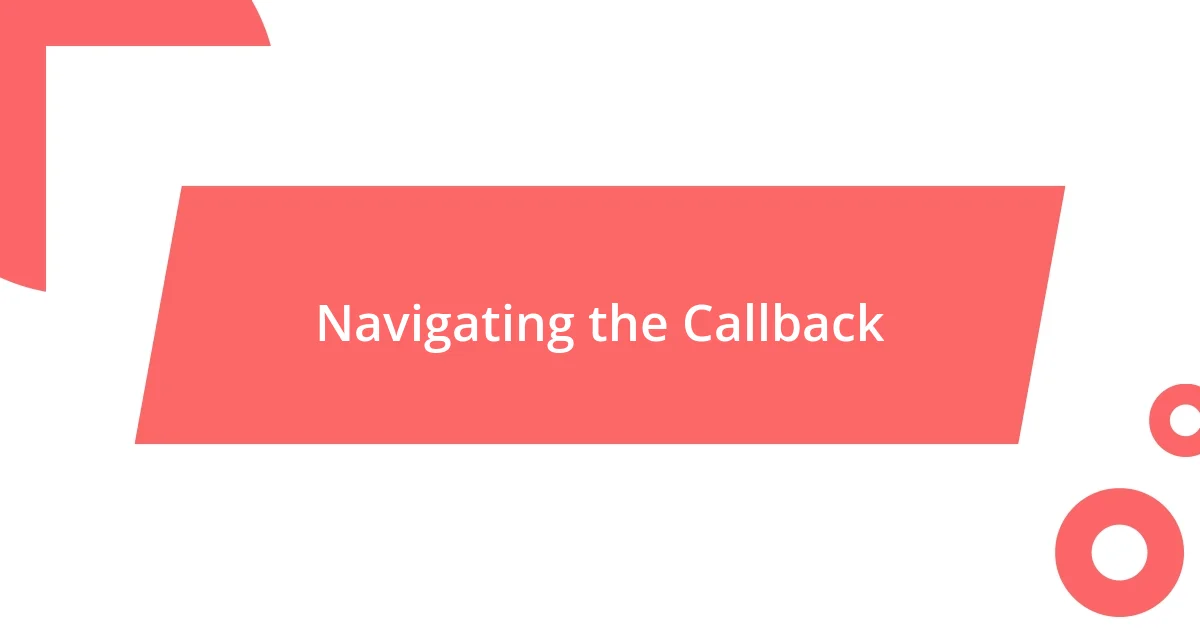
Navigating the Callback
Navigating the callback can feel like a rollercoaster ride, filled with anticipation and nerves. I recall one callback where I stepped into a room full of talent, and my heart raced with both excitement and anxiety. It hit me then that every callback is an opportunity—not just to showcase your skills but to connect with the people in the room. Have you ever found yourself overthinking in those moments? I realized that focusing on the connection rather than the competition helped me stay grounded.
During callbacks, I’ve learned the importance of adaptability. In one experience, they suddenly asked me to read for a different character than I originally auditioned for. Initially, panic surged through me, but I took a deep breath and embraced the challenge. I tapped into my improvisational skills, which I had practiced extensively. This flexibility not only impressed the directors but also boosted my confidence in unexpected situations. Have you ever had to think on your feet during an audition? It’s a rush that can lead to some of your best work.
Finally, don’t underestimate the power of feedback during callbacks. After one performance, a director gave me insightful notes that were valuable for refining my craft. Instead of feeling discouraged, I viewed the feedback as a pathway to growth. Have you ever received constructive criticism that changed your perspective? Embracing those moments can transform your approach and deepen your understanding of the role you’re pursuing.

Managing Post-Audition Emotions
After an audition, it’s easy to get swept away by a tide of emotions—self-doubt, excitement, and everything in between. I remember coming out of an intense audition once, my heart racing, and my mind flooded with thoughts about how I could have done better. It was in that moment I learned to take a step back and breathe. Acknowledging my feelings, rather than dismissing them, was crucial. Have you ever just taken a moment to sit with your emotions? It can be incredibly grounding.
Reflecting on my audition experiences helped me to channel my feelings into something constructive. One time, after a particularly nerve-wracking audition, I journaled about what I felt went well and what I could improve. This practice gave me clarity and transformed anxiety into actionable insights for my next opportunity. Do you ever write down your thoughts after an important event? It’s a simple yet profound way to process and grow.
Surrounding myself with supportive friends and fellow performers made a world of difference too. In the days following auditions, I often have coffee chats where we share not only our successes but also our struggles. One friend once told me how they felt about a rejection, and hearing that I wasn’t alone in my feelings brought a sense of relief I didn’t expect. Does it help you to talk about your experiences with others? Building that network can be invaluable—reminding us that each audition is part of the journey, not just a destination.
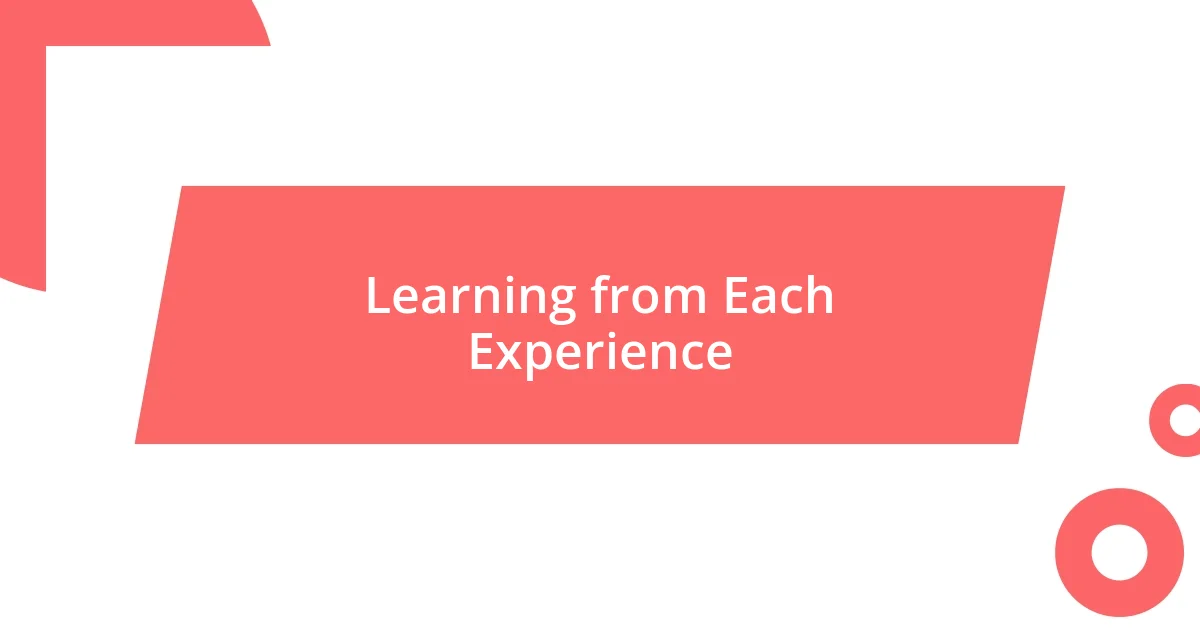
Learning from Each Experience
I’ve found that every audition teaches me something new about myself and my craft. For instance, I attended a workshop after a disappointing audition, and the instructor’s words resonated with me: “Every no gets you closer to a yes.” This shifted my mindset from frustration to curiosity. Have you ever experienced a moment when a simple phrase changed your outlook? It’s incredible how reframing our thoughts can help us grow.
One valuable lesson was learning the art of vulnerability. During a more recent audition, I took a risk by bringing a personal story into my performance. It felt uncomfortably exposing at first, but as I embraced this part of myself, the authenticity translated into my delivery. I noticed the room’s energy shift, which made me realize that when I connect deeply with my own emotions, it resonates with the audience. Have you ever allowed yourself to be vulnerable in your auditions? It can be a transformative experience.
I also discovered the importance of perseverance through this journey. After a string of rejections, I almost considered stepping back from auditions altogether. But then, a mentor encouraged me to keep pushing forward. That conversation reminded me of why I started this path and reinforced that each audition is simply another chance to express my passion, not a definitive measure of my worth. How do you cope with setbacks? Sharing those stories can be vital, as they remind us that determination often leads to unexpected breakthroughs.








